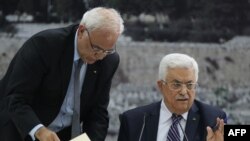JERUSALEM —
Middle East peace negotiations are in crisis a month ahead of a looming April 29 agreement deadline.
Ordinary Israelis and Palestinians have been skeptical about the talks since they resumed in July after a five-year deadlock. And the latest snag comes as no surprise.
At the checkpoint into the West Bank town of Bethlehem, Palestinian computer programmer Saleh Zaharan blamed Secretary of State Kerry for failing to pressure Israel.
“He has the power to force the Israelis to follow the peace process correctly," Zaharan said. "He has the power to do this but we didn’t feel that he is serious to do this.”
Palestinian student Razi Abu Tier said Israel’s failure to release the prisoners shows that it is not negotiating in good faith.
“If Israelis claim that they want peace, I don’t think that the language of ultimatums is the one to be used. I think it’s improper. It’s threatening,” he said.
In Jewish West Jerusalem, accountant Larry Kaufman said the Arab Spring revolutions and the strife in Syria, Iraq and Egypt show that the peace process is a farce.
“How can we really have an arrangement, how can we have an agreement with the Palestinians in this supposed ‘two-state-solution,’ when you turn on your television and see them killing each other?" Kaufman asked. "It’s just an untenable situation.”
Israeli Devorah Eilon is pessimistic.
“I’m not optimistic about peace at all because we don’t have a peace partner," she said. "There’s an element that’s always referred to as our ‘peace partner,’ but we know that they’re not really looking for peace.”
Despite the deep suspicion and skepticism, polls show that many Israelis and Palestinians still support the negotiations. After a long period of calm in Israel and the West Bank, many people concede that talking is better than fighting.
Ordinary Israelis and Palestinians have been skeptical about the talks since they resumed in July after a five-year deadlock. And the latest snag comes as no surprise.
At the checkpoint into the West Bank town of Bethlehem, Palestinian computer programmer Saleh Zaharan blamed Secretary of State Kerry for failing to pressure Israel.
“He has the power to force the Israelis to follow the peace process correctly," Zaharan said. "He has the power to do this but we didn’t feel that he is serious to do this.”
Palestinian student Razi Abu Tier said Israel’s failure to release the prisoners shows that it is not negotiating in good faith.
“If Israelis claim that they want peace, I don’t think that the language of ultimatums is the one to be used. I think it’s improper. It’s threatening,” he said.
In Jewish West Jerusalem, accountant Larry Kaufman said the Arab Spring revolutions and the strife in Syria, Iraq and Egypt show that the peace process is a farce.
“How can we really have an arrangement, how can we have an agreement with the Palestinians in this supposed ‘two-state-solution,’ when you turn on your television and see them killing each other?" Kaufman asked. "It’s just an untenable situation.”
Israeli Devorah Eilon is pessimistic.
“I’m not optimistic about peace at all because we don’t have a peace partner," she said. "There’s an element that’s always referred to as our ‘peace partner,’ but we know that they’re not really looking for peace.”
Despite the deep suspicion and skepticism, polls show that many Israelis and Palestinians still support the negotiations. After a long period of calm in Israel and the West Bank, many people concede that talking is better than fighting.




